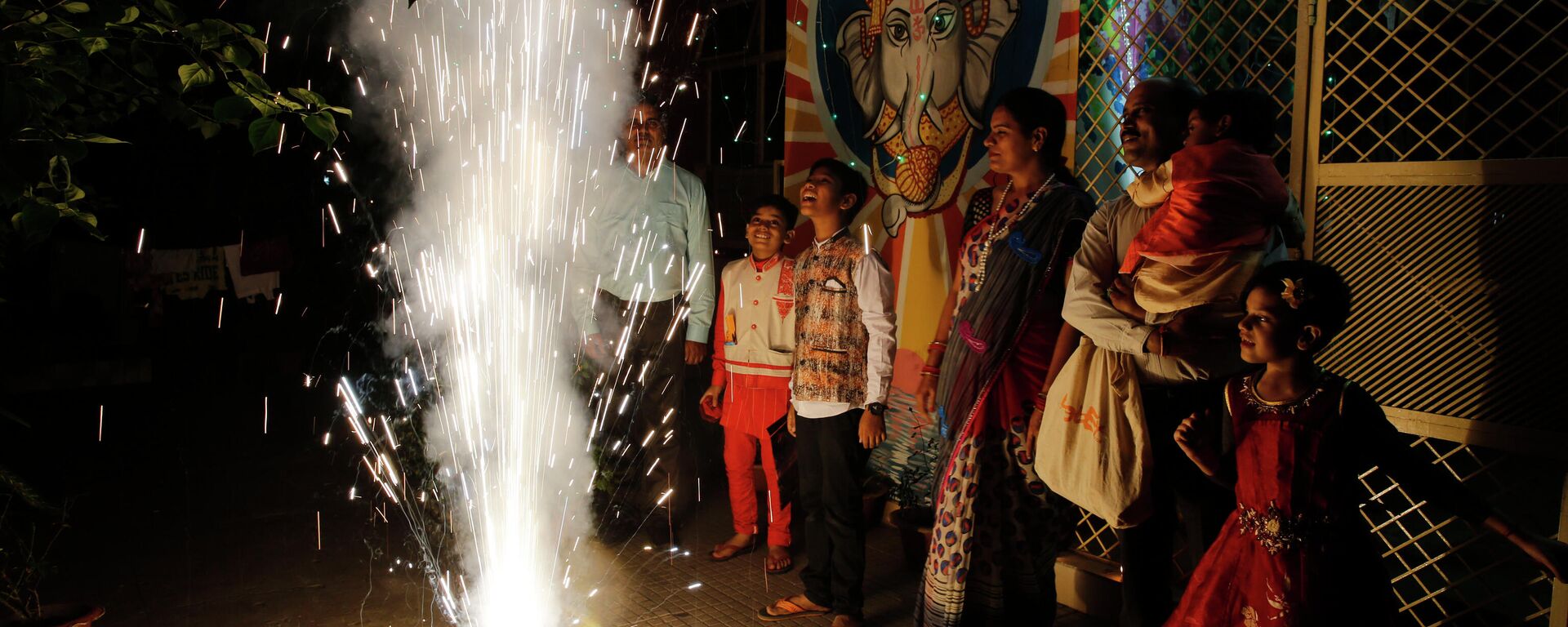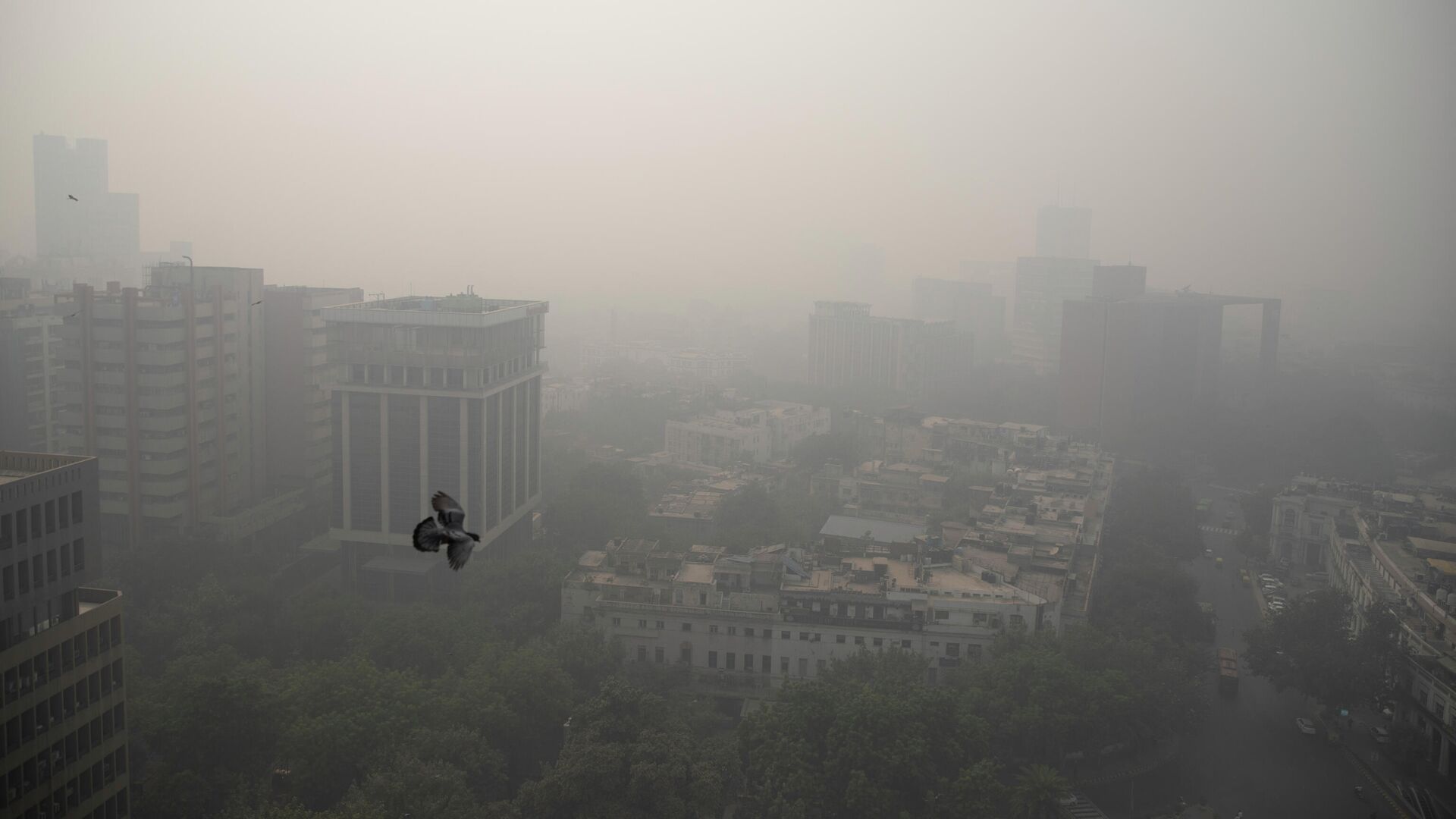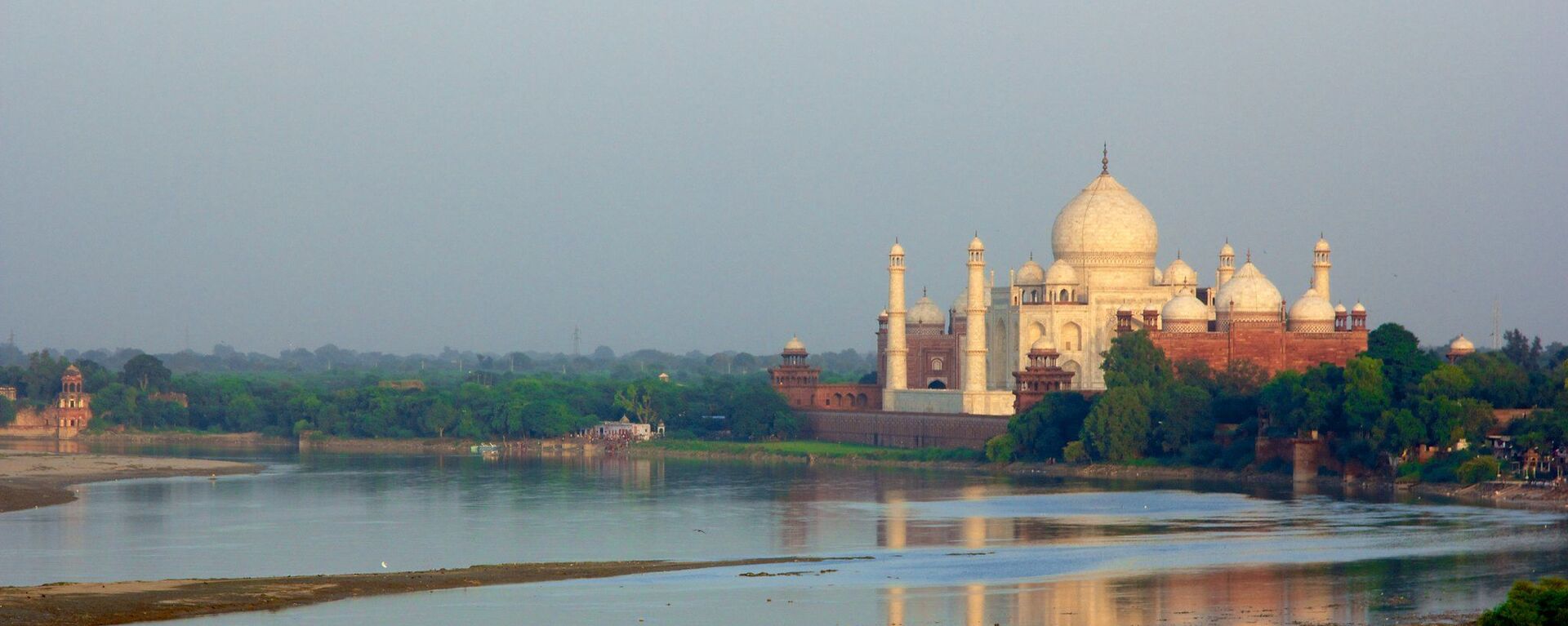https://sputnikglobe.com/20211222/delhis-environment-minister-calls-for-joint-action-plan-to-curb-pollution-1091710481.html
Delhi's Environment Minister Calls For Joint Action Plan to Curb Pollution
Delhi's Environment Minister Calls For Joint Action Plan to Curb Pollution
Sputnik International
Sputnik contacted Delhi’s environment minister Gopal Rai to talk about the deteriorating air quality in the city and find out what the city government is planning to do to control it.
2021-12-22T12:12+0000
2021-12-22T12:12+0000
2022-12-10T11:42+0000
new delhi
elections
delhi
environment protection
air pollution
environment
elections
politics
uttar pradesh
air pollution
https://cdn1.img.sputnikglobe.com/img/07e5/0a/0d/1089882054_0:320:3073:2048_1920x0_80_0_0_9569a71494fef7daa7450877c56dcfa2.jpg
Delhi is not only fighting the latest strain of COVID-19, the so-called Omicron variant, it is also faced with the problem of air pollution at this time of the year.The pollution menace has become so serious that the Supreme Court of India decided to intervene in the matter recently.Sputnik contacted Delhi’s environment minister Gopal Rai to talk about the prevailing situation and find out what the city government is planning to do to control it.Sputnik: Despite government efforts, Delhi continues to face air pollution problems. Have the cause of pollution and solution for it have been figured out? What is being done to get rid of this problem?Gopal Rai: According to a report by Delhi-based think-tank, the Centre for Science and Environment, the city's (total) contribution to air pollution is only 31 percent and the remaining 69 percent comes from outside Delhi.The main reason air pollution is worsening in the capital city, especially during the winter, is because the stubble is being burnt, and firecrackers have been let off during Diwali. We have come up with a two-pronged strategy to curb the menace of pollution – one long-term and the other short-term.As regards the long-term strategy, in the past three to four years we have managed to convert around 1,500 factories that were operating on polluted fuel to Piped Natural Gas (PNG). Then our government is committed to providing electricity 24/7 - but we are ensuring that the generator sets which run on diesel are not used in commercial centres.We have also introduced an e-vehicle policy to ensure that pollution from vehicles can be controlled. All the Delhi Transport Corporation (DTC) buses are already running on Compressed Natural Gas (CNG) and from next month we will introduce electric buses also.In addition to this, we are working on increasing the capital's green belt. For this, we have adopted a tree transplantation policy by which we are not only planting new drives but also transplanting old trees to other places.The national average of the green belt is 20 percent of the area of the city or state but eventually Delhi will have a 22 percent green belt which is more than the national average.As regards the short-term, we have come up with a winter action plan under which Delhi is the first to start a green war room. This works with several agencies in the capital, monitors the pollution and implements the plan.The Delhi government has also launched the Green Delhi App so that the people of Delhi can help to fight pollution. People can report any activity that is causing pollution and our agencies will take action against it.Several other campaigns such as Red Light On, Gaadi Off (Red light on, Vehicle Off), the anti-dust campaign, anti-open burning campaign have been launched to control the pollution from vehicles, construction activities and burning of coal or other things during the winter season.As far as stubble burning is concerned, last year with the help of the Pusa Institute of Technology we launched a bio-decomposer for the stubble, which is left after the harvest. It not only helped to decompose the stubble but also helped to increase the produce in the next harvest. It was so successful that this time more farmers have asked for bio-decomposer capsules.We even suggested that the federal government get other states to use bio-decomposers so that the stubble burning can be stopped and the after-effects of it can be controlled.Apart from all these plans, we have also asked the federal government to form a joint-action plan so that we can work with other states also to control the pollution because this menace can’t be fought alone.Sputnik: Despite curbing building, the air quality has not improved. Do you think construction activities and use of diesel vehicles are still contributing to pollution?Gopal Rai: The studies show that the main sources of pollution in Delhi are vehicles and construction activities. So, as far as construction activities are concerned, we earlier introduced 14-point norms but as conditions got worse we had to stop building work across the city. Now, as the situation has eased a bit, the Commission for Air Quality Management in Delhi NCR, and Adjoining Areas (CAQM) has lifted the ban from construction activities. It allows work on the condition that the construction firms follow dust-control norms.Sputnik: The Delhi government will deregister 10-year-old diesel vehicles from 1 January 2022. Do you think this is a good way to curb the pollution?Gopal Rai: As I said earlier, there are many causes of pollution and we can only control it by curbing one source at a time.As far as the decision to deregister 10-year-old diesel vehicles, everyone knows that the old vehicles spread more pollution and this decision was handed down by the Supreme Court of India itself. So, the decision has been taken considering all the studies and analysis.Sputnik: What kind of support is being given by the federal government?Gopal Rai: It has been really unfortunate that, despite several requests, the Federal Minister of the Environment [Bhupender Yadav] didn’t call for a joint meeting of state environment ministers to coordinate a joint action plan. I have written to him three times but there has been no response from him.I think that the role of the federal government is crucial because we have to work in harmony as this is a common problem especially in the states adjoining Delhi. I can only say that the federal government should actively work on it so that we can control pollution faster and in a much more effective way.Sputnik: Pollution of the Yamuna river is also a big concern. Delhi state chief Arvind Kejriwal vowed that the river would be cleaned but no significant progress has been made to date. Don’t you think that the Delhi government has failed in keeping its promises?Gopal Rai: I don’t think the Aam Aadmi Party (AAP)-led government has failed in fulfilling the promise. Yes, there has been a delay in cleaning the Yamuna river but everybody is aware that because of COVID-19 several works were put to a halt.Delhi state chief Arvind Kejriwal is committed to cleaning the Yamuna and we have even announced a six-point plan for it. The implementation of the plan has started and we are sure that in the next three years the Yamuna will be clean.Sputnik: Your party - Aam Aadmi - is contesting elections in other states, with Uttar Pradesh, Punjab, and Goa the most prominent. What is the party’s strategy apart from providing free electricity and free water?Gopal Rai: We have a single-line strategy: we are going to the people with the work done by the AAP in Delhi. We are asking people to give the AAP a chance, as they have already given a number of chances to other political parties in all the states.
https://sputnikglobe.com/20211103/diwali-night-may-plunge-delhis-air-quality-to-severe-level-study-warns-1090433718.html
https://sputnikglobe.com/20210625/as-algae-ammonia-level-rise-in-river-yamuna-delhi-households-strive-for-clean-drinking-water-1083239785.html
new delhi
delhi
uttar pradesh
Sputnik International
feedback@sputniknews.com
+74956456601
MIA „Rossiya Segodnya“
2021
Rahul Trivedi
https://cdn1.img.sputnikglobe.com/img/07e5/05/12/1082926121_0:-1:627:627_100x100_80_0_0_d882e1a63f627c25b7a534fb8b8234d7.jpg
Rahul Trivedi
https://cdn1.img.sputnikglobe.com/img/07e5/05/12/1082926121_0:-1:627:627_100x100_80_0_0_d882e1a63f627c25b7a534fb8b8234d7.jpg
News
en_EN
Sputnik International
feedback@sputniknews.com
+74956456601
MIA „Rossiya Segodnya“
Sputnik International
feedback@sputniknews.com
+74956456601
MIA „Rossiya Segodnya“
Rahul Trivedi
https://cdn1.img.sputnikglobe.com/img/07e5/05/12/1082926121_0:-1:627:627_100x100_80_0_0_d882e1a63f627c25b7a534fb8b8234d7.jpg
air quality, delhi pollution, air pollution, delhi's environment minister, gopal rai
air quality, delhi pollution, air pollution, delhi's environment minister, gopal rai
Delhi's Environment Minister Calls For Joint Action Plan to Curb Pollution
12:12 GMT 22.12.2021 (Updated: 11:42 GMT 10.12.2022) Air pollution in the Indian capital of New Delhi is a recurring problem. Every year during the winter, the city's air quality worsens, leaving inhabitants prey to all manner of respiratory disorders.
Delhi is not only fighting the latest strain of COVID-19, the so-called Omicron variant, it is also faced with the problem of air pollution at this time of the year.
The pollution menace has become so serious that the Supreme Court of India decided to intervene in the matter recently.
Sputnik contacted Delhi’s environment minister Gopal Rai to talk about the prevailing situation and find out what the city government is planning to do to control it.
Sputnik: Despite government efforts, Delhi continues to face air pollution problems. Have the cause of pollution and solution for it have been figured out? What is being done to get rid of this problem?
Gopal Rai: According to a report by Delhi-based think-tank, the Centre for Science and Environment, the city's (total) contribution to air pollution is only 31 percent and the remaining 69 percent comes from outside Delhi.
The main reason air pollution is worsening in the capital city, especially during the winter, is because the stubble is being burnt, and firecrackers have been let off during Diwali. We have come up with a two-pronged strategy to curb the menace of pollution – one long-term and the other short-term.
As regards the long-term strategy, in the past three to four years we have managed to convert around 1,500 factories that were operating on polluted fuel to Piped Natural Gas (PNG). Then our government is committed to providing electricity 24/7 - but we are ensuring that the generator sets which run on diesel are not used in
commercial centres.We have also introduced an e-vehicle policy to ensure that pollution from vehicles can be controlled. All the Delhi Transport Corporation (DTC) buses are already running on Compressed Natural Gas (CNG) and from next month we will introduce electric buses also.
In addition to this, we are working on increasing the capital's green belt. For this, we have adopted a tree transplantation policy by which we are not only planting new drives but also transplanting old trees to other places.
The national average of the green belt is 20 percent of the area of the city or state but eventually Delhi will have a 22 percent green belt which is more than the national average.

3 November 2021, 08:11 GMT
As regards the short-term, we have come up with a winter action plan under which Delhi is the first to start a green war room. This works with several agencies in the capital, monitors the pollution and implements the plan.
The Delhi government has also launched the Green Delhi App so that the people of Delhi can help to fight pollution. People can report any activity that is causing pollution and our agencies will take action against it.
Several other campaigns such as Red Light On, Gaadi Off (Red light on, Vehicle Off), the anti-dust campaign, anti-open burning campaign have been launched to control the pollution from vehicles, construction activities and burning of coal or other things during the winter season.
As far as stubble burning is concerned, last year with the help of the Pusa Institute of Technology we launched a bio-decomposer for the stubble, which is left after the harvest. It not only helped to decompose the stubble but also helped to increase the produce in the next harvest. It was so successful that this time more farmers have asked for bio-decomposer capsules.
We even suggested that the federal government get other states to use bio-decomposers so that the stubble burning can be stopped and the after-effects of it can be controlled.
Apart from all these plans, we have also asked the federal government to form a joint-action plan so that we can work with other states also to control the pollution because this menace can’t be fought alone.
Sputnik: Despite curbing building, the air quality has not improved. Do you think construction activities and use of diesel vehicles are still contributing to pollution?
Gopal Rai: The studies show that the main sources of pollution in Delhi are vehicles and construction activities. So, as far as construction activities are concerned, we earlier introduced 14-point norms but as conditions got worse we had to stop building work across the city. Now, as the situation has eased a bit, the Commission for Air Quality Management in Delhi NCR, and Adjoining Areas (CAQM) has lifted the ban from construction activities. It allows work on the condition that the construction firms follow dust-control norms.
Sputnik: The Delhi government will deregister 10-year-old diesel vehicles from 1 January 2022. Do you think this is a good way to curb the pollution?
Gopal Rai: As I said earlier, there are many causes of pollution and we can only control it by curbing one source at a time.
As far as the decision to deregister 10-year-old diesel vehicles, everyone knows that the old vehicles spread more pollution and this decision was handed down by the Supreme Court of India itself. So, the decision has been taken considering all the studies and analysis.
Sputnik: What kind of support is being given by the federal government?
Gopal Rai: It has been really unfortunate that, despite several requests, the Federal Minister of the Environment [Bhupender Yadav] didn’t call for a joint meeting of state environment ministers to coordinate a joint action plan. I have written to him three times but there has been no response from him.
I think that the role of the federal government is crucial because we have to work in harmony as this is a common problem especially in the states adjoining Delhi. I can only say that the federal government should actively work on it so that we can control pollution faster and in a much more
effective way.Sputnik: Pollution of the Yamuna river is also a big concern. Delhi state chief Arvind Kejriwal vowed that the river would be cleaned but no significant progress has been made to date. Don’t you think that the Delhi government has failed in keeping its promises?
Gopal Rai: I don’t think the Aam Aadmi Party (AAP)-led government has failed in fulfilling the promise. Yes, there has been a delay in cleaning the Yamuna river but everybody is aware that because of COVID-19 several works were put to a halt.
Delhi state chief Arvind Kejriwal is committed to cleaning the Yamuna and we have even announced a six-point plan for it. The implementation of the plan has started and we are sure that in the next three years the Yamuna will be clean.
Sputnik: Your party - Aam Aadmi - is contesting elections in other states, with Uttar Pradesh, Punjab, and Goa the most prominent. What is the party’s strategy apart from providing free electricity and free water?
Gopal Rai: We have a single-line strategy: we are going to the people with the work done by the AAP in Delhi. We are asking people to give the AAP a chance, as they have already given a number of chances to other political parties in all the states.




